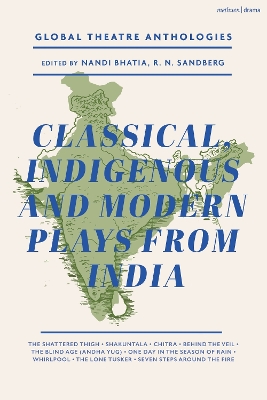Global Theatre Anthologies
1 total work
Classical and Modern Plays from India
by Bhasa, Kalidasa, Rabindranath Tagore, Rashid Jahan, Dharamvir Bharati, Mohan Rakesh, Datta Bhagat, K. N. Panikkar, and Mahesh Dattini
The power of theatrical performance is universal, but the style and concerns of theatre are specific to individual cultures.
India's dramatic literature demonstrates extraordinary range, depth, and sophistication. Thousands of years ago the theory and practice of how to make theatre was detailed in the Natyashastra. As a result, powerful plays were written; and, over time, a multiplicity of theatrical cultures have developed.
Examining recurring themes such as the misuse of authority, the oppressive caste practices, the expression and legitimacy of romantic love, societal gender expectations, and the search for meaning in seemingly empty or destructive human endeavours, this anthology threads together diverse cultures, drawing connections across space and time. Though each play is its own unique entity, exploring them together allows readers to consider what theatrical techniques and cultural concerns may be significant aspects of Indian drama.
Featuring work by the first Asian Nobel Laureate, acclaimed political writers, and a female gynaecologist who created startling drama from the women she had encountered, the range of playwrights speaks to the cultural diversity of the drama: with plays ranging from classical Sanskrit drama through major works from the beginning to the end of the 20th Century.
Through taking an international perspective, Global Theatre Anthologies draws together work from ancient, indigenous, and modern times, encouraging thinking across boundaries and questioning what theatrical and societal values are part of India drama,, and what the relationships are between the old and new world.
